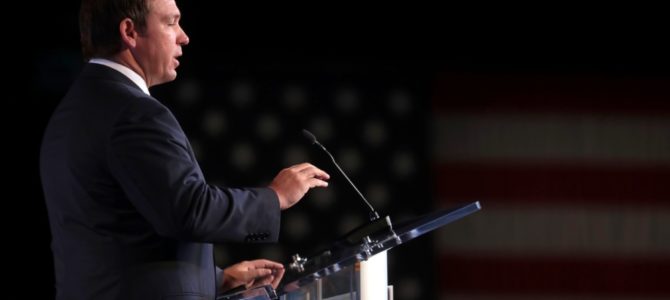
At a press conference Friday, Florida Gov. Ron DeSantis announced the elimination of all previously implemented COVID-19 restrictions for his state. The action removed state-level social distancing requirements and capacity limits for businesses including restaurants and bars. It was a daring move for a state currently recording more than 100 deaths from COVID-19 per day. By contrast, New York remains in a tight lockdown despite experiencing around five COVID-19 deaths per day.
During Friday’s announcement, DeSantis repeatedly referenced a roundtable he had hosted the day before. Instead of ruling merely by instinct or by listening to the sole voices of his health department, DeSantis met with a group of highly credentialed and respected doctors from America’s top institutions to gather information.
The group included Dr. Jay Bhattacharya, a professor of Medicine at Stanford University, Dr. Martin Kulldorff, a professor at Harvard University Medical School, and Dr. Michael Levitt, a Stanford University professor of Structural Biology and a Nobel Laureate.
During the discussion, DeSantis guided the group through every major COVID-19 issue. For example, DeSantis asked the professors whether general lockdowns should be off the table. Each expert answered in with a forceful “yes.” Kulldorff noted that lockdowns drag out the progression of the disease such that “it will be much harder to protect the elderly because they can’t self-isolate forever.” Levitt stated lockdowns are “a treatment that can often kill the patient.”
One of the most direct and emphatic exclamations came from Bhattacharya, who declared, “Another lockdown would be disastrous.” Bhattacharya noted that, beyond basic education, many students receive nutrition and counseling at schools — locations that also often serve as a way to detect abuse.
Bhattacharya spoke of how lockdowns scare people away from hospitals and prevent children from getting immunizations, concluding, “Lockdown costs are absolutely catastrophic.” Beyond their costs, Bhattacharya also noted lockdowns are ineffective, stating, “Argentina and Spain famously locked down very sharply, and yet they’re still seeing a sharp rise in cases.”
In his announcement lifting restrictions, DeSantis directly referenced the high costs of lockdowns discussed at the roundtable, discussing the excess mortality likely caused by declining emergency room visits. Such a frank discussion of the negative aspects starkly contrasts to other governors.
It’s hard to envision New York Gov. Andrew Cuomo would ever admit the lockdowns themselves caused deaths. Cuomo is, after all, the same political leader who famously said, “If everything we do saves just one life, I’ll be happy.”
DeSantis further justified opening Florida by citing the original basis for the response to COVID-19: flattening the curve to avoid hospital overruns. When the experts were asked if they thought opening up Florida would overwhelm the medical system, DeSantis recalled, “They all said no, no and no.”
At the news conference, DeSantis also announced that he was suspending lockdown-related fines and penalties for individuals. Furthermore, local governments can no longer limit restaurant capacities to below 50 percent.
To be sure, opening Florida is a gamble. If things go awry, large increases in cases, hospitalizations, or deaths could end DeSantis’s political career.
If things go well, however, and DeSantis is seen as leading the country out of the COVID-19 panic, it could lead to openings across the country, benefit President Trump’s electoral chances this November, and possibly fuel a presidential run for DeSantis in 2024. In the latter scenario, a Floridian success story would likely damage potential Democratic opponents who were on the wrong side of the response to COVID-19.
DeSantis is acting with a significant amount of evidence to support his action. Roundtable participants repeatedly cited Sweden as an example of an open society that never fully locked down or closed schools for young students, yet has lower per-capita mortality than the United States.
Throughout the roundtable, whether it was the ineffectiveness of masks, the effects of false positives on testing and data, or the fact that COVID-19 is less deadly for college students than catching the seasonal flu, DeSantis and the experts repeatedly discussed real-world evidence pointing to the ability of Florida to reopen without a resulting catastrophe.
The doctors also discussed the current state of academia and the pressure to not go against the prevailing fear-driven storyline. Pushing back, the panelists argued science should be used to find the truth, not as a mechanism for controlling the masses.
There were also moments of levity. At one point, Kulldorff recommended that grandmothers stay away from college parties.
Throughout the roundtable and subsequent press conference, DeSantis proved himself knowledgeable about the response to COVID-19 on both a scientific and policy level, and in doing so, he’s provided a roadmap of how to reopen society. The path forward includes gathering evidence from all over the world, consulting with credible experts, and applying hard lessons learned at ground level.
It is a bold move by DeSantis that bodes well not only for Florida but for the country.









